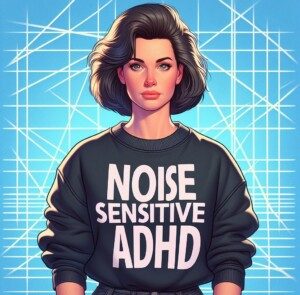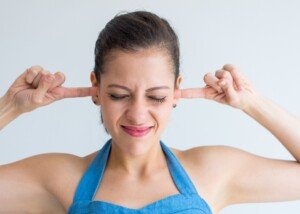
One of the symptoms of ADHD, according to WebMD, is the following:
“Easily distracted by irrelevant stimuli and frequently interrupting ongoing tasks to attend to trivial noises or events that are usually ignored by others.”
This describes me perfectly. However, this does not mean I have ADHD or some kind of problem or neurological issue.
People who’ve been diagnosed with “noise sensitivity” or “hypersensitivity to noise” due to ADHD would find that, in certain environments (e.g., out in the country), their alleged problem would be non-existent.
In a culture replete with relentless auditory stimuli, seems like the oddballs are people who CAN ignore it all.
If your coworker keeps repeatedly tapping their pen on the desk, or keeps making clucking and smacking sounds with endless gum chewing, and you find this disruptive to your concentration, WHO really has the problem?
Not you! This is an issue of being considerate vs. inconsiderate, not who might have ADHD (or ADD).
Some years ago I was repeatedly distracted by ongoing giggling of a young woman who was being taken on a tour of my workplace. For all I know, nobody could stand it.
But even if I’d been the only one, this doesn’t make me noise sensitive or ADHD.
Instead of wondering why I’d be the only one distracted by ongoing giggling (nobody was telling funny jokes; it was merely a tour), the better question is why was this woman giggling at everything?
Let’s look at some culture-based noises that people who’ve been diagnosed with ADHD are driven “crazy” by:
- loud high pitched beeps from vehicles backing out
- motorcycle engines and men fooling around with their car motors
- clocks clanging every hour
- ticking clocks
- hums from various machines (computers, lighting fixtures, ventilation, refrigerators, copy machines)
- chairs squeaking
- bus and car brakes shrieking.
What’s ADHD “noise sensitivity” today was non-existent 100 years ago.
The website for the Environmental Protection Agency identifies noise pollution as a real problem:
Noise pollution adversely affects the lives of millions of people. Studies have shown that there are direct links between noise and health.
Problems related to noise include stress related illnesses, high blood pressure, speech interference, hearing loss, sleep disruption, and lost productivity.
Noise Induced Hearing Loss (NIHL) is the most common and often discussed health effect, but research has shown that exposure to constant or high levels of noise can cause countless adverse health effects.
What about noise that’s been around since the beginning of time? That would be loud laughter, shrieking and screaming children, noisy eating, knuckle cracking, whistling and humming.
I once finally told a coworker that his incessant whistling was very annoying. This doesn’t make me ADHD. Brazen, maybe, but not ADHD.
More power to those who can tune out rude people.
But this doesn’t mean that others have ADHD or “noise sensitivity.” Like the EPA says, noise pollution is real.
I don’t consider myself ADHD just because I wear ear plugs at Whole Foods Market where piped in music blares and toddlers scream nearby, or at the gym where attention-seeking men smash metal weight plates into each other.
I don’t want noise induced hearing loss. This doesn’t make me ADHD.
I’m no more ADHD for wearing ear plugs to preserve good hearing than someone is for wearing sun block to protect their skin, or avoiding cigarette smoke to protect their lungs. Being health conscious does not make you ADHD.
The criteria for ADHD has been expanded over the years, and some of this involves how one reacts to noise.
If my reaction to unnecessary and offensive sounds (e.g., neighbor keeps revving up his thundering car engine over a 30 minute period just to play around with it, versus revving up a malfunctioning engine for a few minutes to get it going so he could drive to work) means I probably have ADHD, then that’s fine with me because it also means I’ll have great hearing well into old age since I make efforts to avoid loud or shrieking sounds.
There’s normal and necessary noise (lawn mower, carpet steam cleaner, crying infant or injured young child), and then there’s intrusive and unneeded noise (letting toddlers and preschoolers scream in stores, raucous laughter in the workplace, adults screaming over petty things, incessantly barking dog).
If you want to protect your hearing from harm and be a healthier person, this doesn’t mean you have “noise sensitivity” or ADHD.
UPDATE: In March 2022, the author of this article was diagnosed with Autism Spectrum Disorder — but not ADHD.
Though the autism explains getting distracted by irrelevant sounds that would not be noticed by other people, and finding some non-loud sounds to be very annoying — the desire to protect one’s hearing in loud environments to avoid future hearing loss is not indicative of a neurodivergent mind.









































